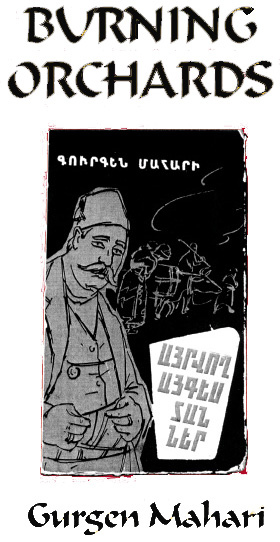
Translation
by Dickran Tahta, Haig Tahta and Hasmik Ghazarian
Gurgen Marhari’s controversial novel, Burning Orchards,
is set in the Ottoman city of Van, Eastern Anatolia, during
the period leading up to the Armenian rebellion of 1915
and relates the epic story of the events which culminated
in the catastrophe of the following years, wonderfully
told by onof the great writers emerging from Soviet Armenia.
Written with an abiding humanity, Mahari’s characters are portrayed as
complex and flawed – neither hero nor villain but keenly observed and
evoked with a tender humour. Burning Orchards offers a version of events leading
up to the siege of Van different from the received, politically charged accounts,
even daring to reflect something of the loyalty many Ottoman Armenians had
felt towards the former Empire.
First published in Armenian in 1966 after Mahari’s long exile in Siberian,
Burning Orchards (Ayrvogh Aygestanner), was banned and publicly burned in the
streets of Yerevan, even though the authorities in Moscow had eventually agreed
to its publication. Much against the wishes of his wife he tried to rewrite
the novel, removing passages criticising some Armenian political parties and
leaders, but dying before it could be finalised. The translation offered here
is of the banned 1966 publication. A brilliant work, epic in scope and masterful
in its depiction of the cruel displacement of an ancient people from their
historic homeland, Burning Orchards is a re-discovered classic.

